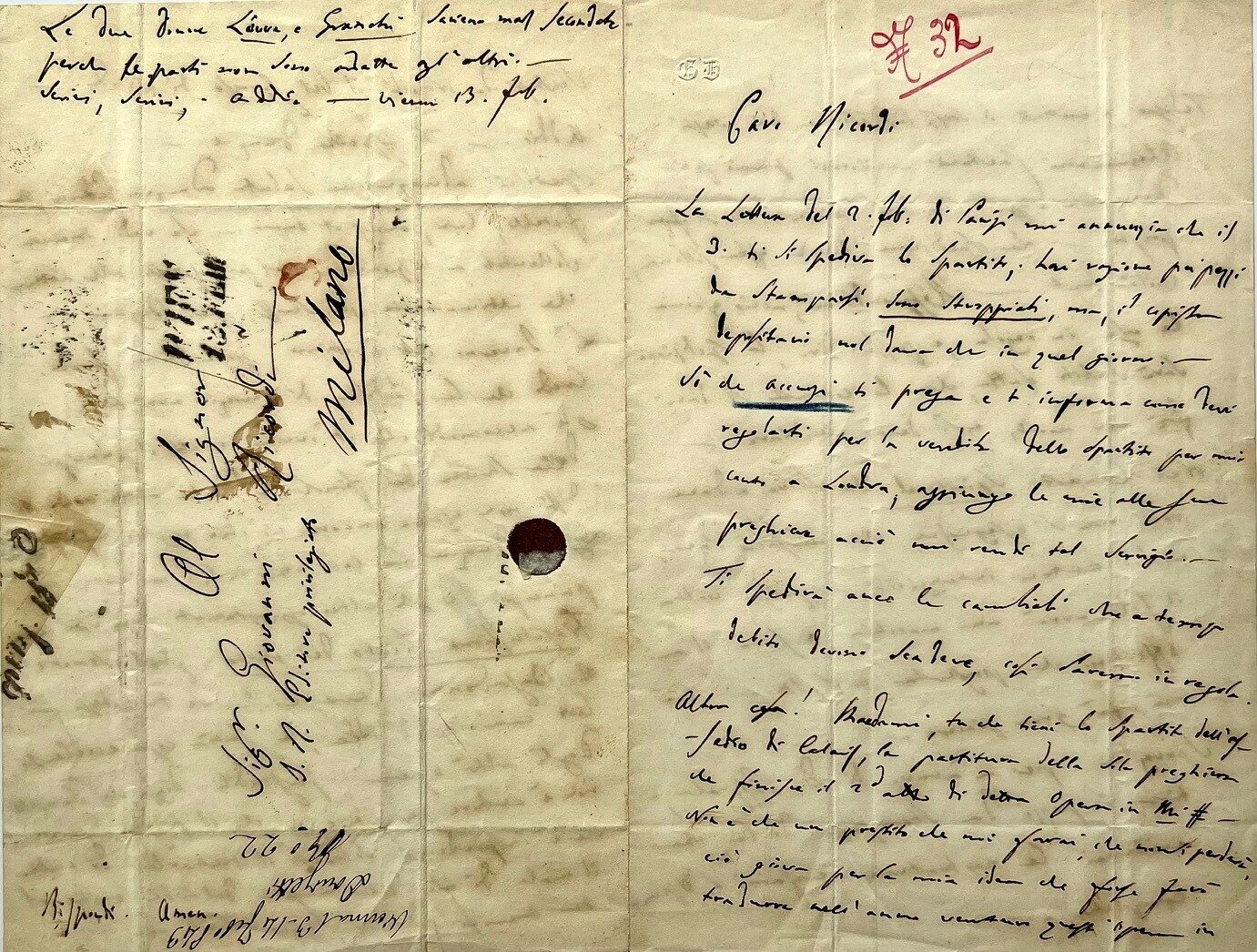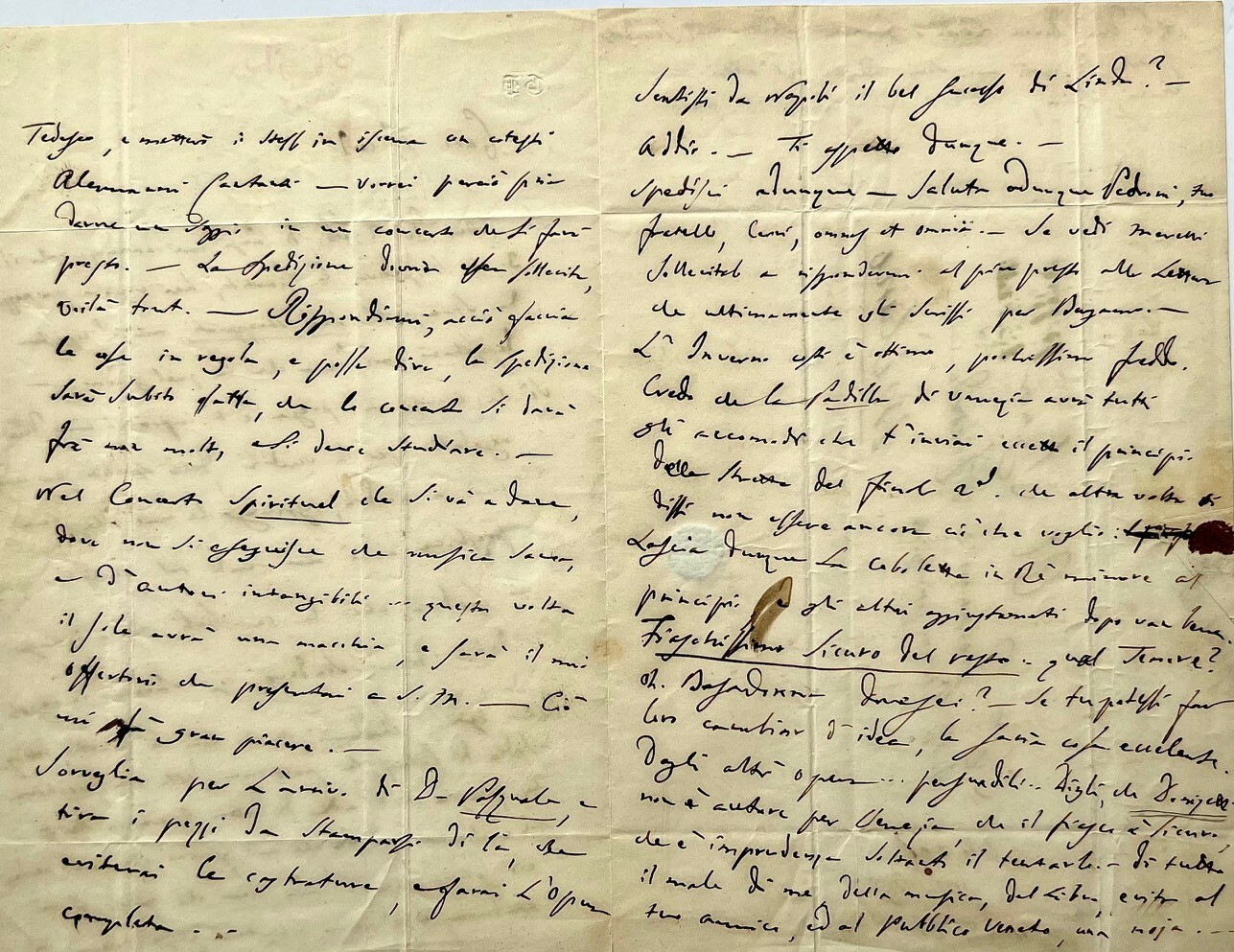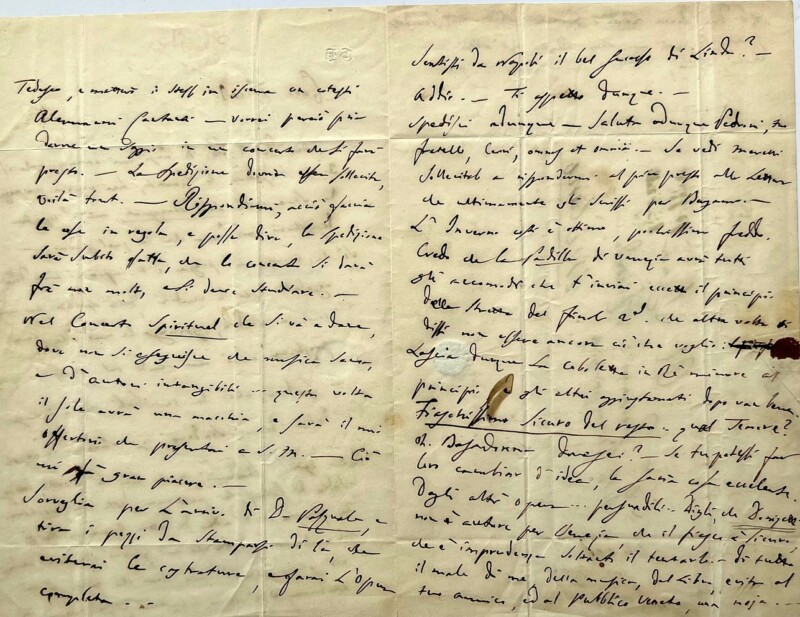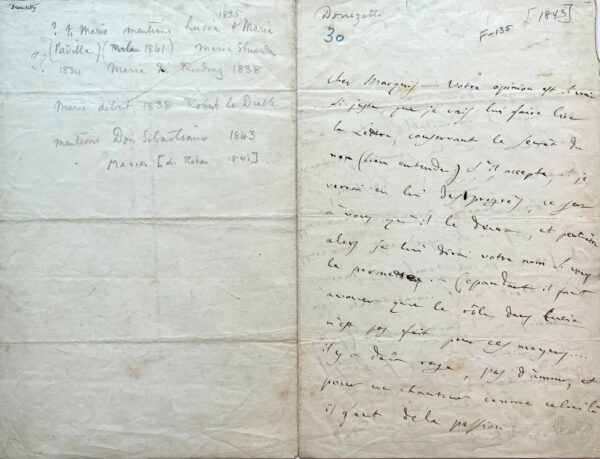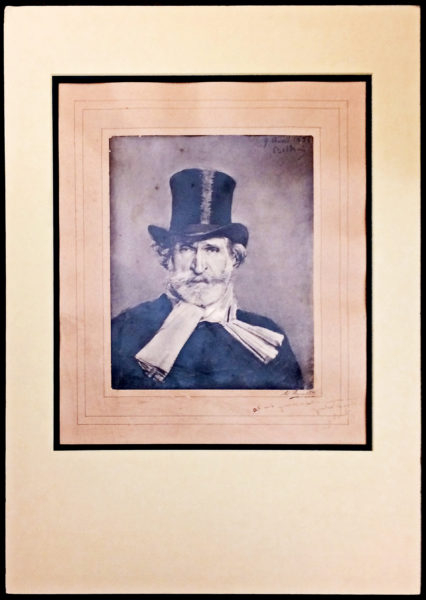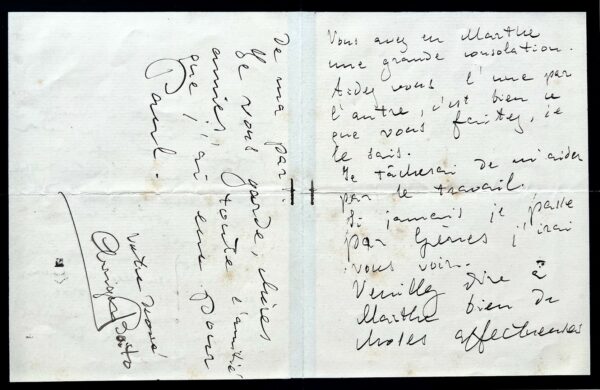I know that Accursi has asked you to let him know how to compensate you for selling the score for me in London, and I am adding my request to his for having done me this favor. I will send you the promissory notes that will come due on the given date, and then everything between us will be in order.
One other thing! – Since you have the score of the Assedio di Calais (Siege of Calais), please send me the part of the prayer at the end of that opera’s second act in e natural. You will not just be lending me something that will not get lost; but it will be useful for the idea I have to perhaps have the opera translated next year into German and to stage it myself with German singers. But first I would like to present one piece of it in a concert that is taking place soon. You will have to send it promptly; voila tout [that’s all]. – Please send an answer regarding the compensation and tell me if you can send the part right away, because the concert is soon, and we’ll need time to rehearse it.
In the Concert Spirituel that is about to be given here, in which only sacred music will be played, by untouchable composers, there will be only one cloud over the sun this time, namely my offertorio that I presented to H.M. – It will give me great pleasure.
Keep an eye on the mail for D[on]. Pasquale, and take the pieces to be printed from there to avoid castrating cuts, and you will get the work done.
Did you hear from Naples about Linda’s wonderful success? Addio. – I hope to see you. So hurry up. Give my regards to Pedroni, your brother, greetings to one and all. If you see Merelli, please ask him to respond as soon as possible to the letter I recently sent him from Bergamo. – It has been a great winter here, very little cold. I think that Padilla in Venice has all the corrections I sent you except for the start of the very end of the finale 2 that I told you sometime was not yet what I wanted: so leave the cabaletta in d minor for the start, and the other adjustments after that will be fine. And then there is the real fiasco: what tenor? Oh, Basadonna, where are you? If you could make them change their mind, it would be most excellent. Others, or else… persuade them … Tell them that Donizetti is not the composer for Venice, that it is a fiasco for sure, that even just trying is offensive. Of all the bad things about me, the music, the book, spare yourself and the Venetian public annoyance.
The two women Löwe and Granchi will be hard to accompany because the parts are not suitable for the others. Write, write! Addio!,..”
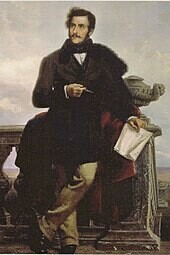
Gaetano Donizetti
Though he had composed more than 30 operas by 1830, it was not until after Bellini’s death in 1835 that Donizetti came to dominate Italian opera, composing works characterized by agile melodies written for virtuoso singers.
His three-act opera L’assedio di Calais (The siege of Calais) premiered in 1836 in Naples with mezzo soprano Almerinda Manzocchi Granchi (1804-1869) who had performed in Donizetti’s Anne Boleyn and Torquato Tasso in Madrid in the early 1830s and later played the role of Sara, Duchess of Nottingham in his 1837 opera Roberto Devereux.
Donizetti’s opera Maria Padilla premiered in La Scala in 1841, with German soprano Sophie Löwe (1815-1866) in the title role, one of her best-known performances. Löwe retired from the stage in 1848 upon her marriage to Prince Friedrich Adalbert of Liechtenstein. Also discussed in our letter is a Naples production of his opera Linda di Chamounix, which premiered in Vienna in 1842.
It was for Giovanni Basadonna (1806-1850) that Donizetti composed his Fausta and Robert Devereux but his illustrious career was cut short by vocal paralysis while singing in Naples – likely the cause of Donizetti’s lament in our letter – after which he was primarily a singing teacher in Vienna.
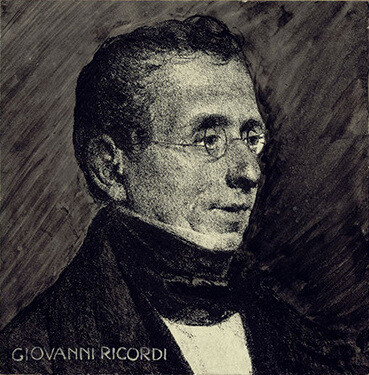
Giovanni Ricordi
Donizetti also mentions Italian impresario and librettist Bartolomeo Merelli (1794-1879) who “studied privately with [German composer Johann Simon] Mayr, at whose insistence he wrote verses for the young Donizetti to set to music. From 1818 to 1824 Merelli was active as a professional librettist, providing opera texts for Mayr, Vaccai and Donizetti: these included Enrico di Borgogna (1818), Donizetti’s first opera to be given on a public stage, and Zoraide di Granata (1822), his first real success,” (The New Grove Dictionary). Later Merelli acted as an impresario and “is best remembered as the man who launched Verdi on his operatic career in 1839,” (ibid.).
Donizetti self-effacingly discusses a work to be performed at the upcoming Concert Spirituel in Vienna, likely his Grande Offertory in E major, published in Vienna in 1844, and possibly dedicated to Kaiser Franz Josef, “H[is] M[ajesty].”
Michele Accursi (?-?) was Donizetti’s friend and assistant, a papal spy, described as “Donizetti’s Paris factotum, [an] Italian exile, and politically treacherous double agent,” (Donizetti and the World of Opera in Italy, Paris, and Vienna in the First Half of the Nineteenth Century, Weinstock). Interestingly, it was Accursi who both facilitated the composition of Donizetti’s comic masterpiece, the opera buffa Don Pasquale, [also referred to in our letter] and to whom, for many years, the libretto was attributed. Accursi is responsible for suggesting to Giovanni Ruffini, an Italian patriot and political exile living in Paris, that he write a libretto for Donizetti. However, the latter so departed from the original libretto that Ruffini disavowed the work, and the score was signed “M.A.” leading to the misattribution. Donizetti composed the opera for Paris’ Théâtre-Italien following his appointment as Kapellmeister to the Austrian court in Vienna in mid-1842, and it premiered in Paris on January 3, 1843.
After learning engraving and printing at the firm of Breitkopf & Härtel, Ricordi, a violinist, founded G. Ricordi & C. in Milan in 1808. The contract securing the publishing rights to all the music performed at La Scala became the basis for the company’s vast catalogue and enormous success, becoming by the 1840s one of the largest music publishers in Europe, enjoying a close relationship with Rossini, Bellini, Verdi, and Donizetti. Among the many changes he introduced to the music publishing business was the payment of royalties to composers. After his 1853 death, the firm continued under his descendants until 1919, and remains active to this day.
Penned on a folded sheet with the integral address leaf intact. Docketed in red pencil in the upper margin of the first page and on the address panel, which notes the year, and in excellent condition.

